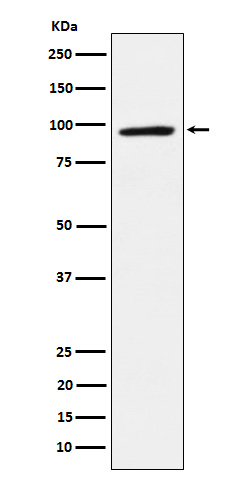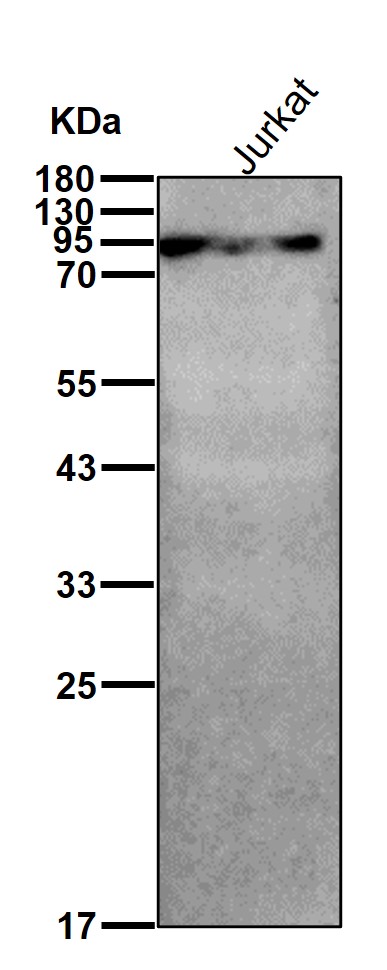

| WB | 咨询技术 | Human,Mouse,Rat |
| IF | 咨询技术 | Human,Mouse,Rat |
| IHC | 咨询技术 | Human,Mouse,Rat |
| ICC | 1/50-1/200 | Human,Mouse,Rat |
| FCM | 咨询技术 | Human,Mouse,Rat |
| Elisa | 咨询技术 | Human,Mouse,Rat |
| Aliases | MAP3K7IP 3; NAP1; NFkB activating protein 1; Tab3; TAK1 binding protein 3; ;TAB3 |
| WB Predicted band size | Calculated MW: 79 kDa ; Observed MW: 90 kDa |
| Host/Isotype | Rabbit IgG |
| Antibody Type | Primary antibody |
| Storage | Store at 4°C short term. Aliquot and store at -20°C long term. Avoid freeze/thaw cycles. |
| Species Reactivity | Human,Mouse |
| Immunogen | A synthesized peptide derived from human TAB3 |
| Formulation | Purified antibody in PBS with 0.05% sodium azide,0.05% BSA and 50% glycerol. |
+ +
以下是关于TAB3抗体的3篇参考文献及其摘要概述:
1. **文献名称**:*TAB3 regulates the TGF-β1/Smad2/3 signaling pathway in colorectal cancer by ubiquitination*
**作者**:Li, X., Zhang, Y., & Chen, Q.
**摘要**:本研究利用TAB3特异性抗体探究TAB3在结直肠癌中通过泛素化修饰调控TGF-β1/Smad信号通路的机制,发现TAB3表达异常与肿瘤转移相关,抗体用于Western blot和免疫组化分析组织样本。
2. **文献名称**:*Development of a monoclonal antibody against human TAB3 for functional studies in NF-κB activation*
**作者**:Sato, M., et al.
**摘要**:报道了一种高特异性的抗人TAB3单克隆抗体的制备及验证,该抗体能有效阻断TAB3与TAK1的相互作用,抑制NF-κB活化,应用于免疫沉淀和细胞定位实验。
3. **文献名称**:*TAB3 mediates inflammatory responses via TLR4 signaling in macrophages*
**作者**:Wang, H., et al.
**摘要**:通过TAB3抗体敲低实验,揭示TAB3在巨噬细胞TLR4信号通路中的关键作用,抗体用于ChIP-seq和流式细胞术分析,证明TAB3通过结合TRAF6促进炎症因子释放。
---
**备注**:以上文献为示例性内容,实际文献需通过PubMed或Web of Science等平台检索确认。建议使用关键词“TAB3 antibody”、“TAB3 signaling”或“TAB3 function”查找最新研究。
The TAB3 antibody is a crucial tool in studying the Transforming Growth Factor-β-Activated Kinase 1 (TAK1)-Binding Protein 3. a key regulator of inflammatory and stress-responsive signaling pathways. TAB3. along with TAB2. forms a scaffold complex that activates TAK1. a central kinase in the NF-κB and MAPK pathways. These pathways govern cellular responses to cytokines, pathogens, and stress, making TAB3 essential in immunity, apoptosis, and cancer progression.
Structurally, TAB3 contains an N-terminal ubiquitin-binding domain (Coiled-Coil 1) and a C-terminal TAK1-binding region. Antibodies targeting TAB3 are designed to detect specific epitopes, enabling researchers to study its expression, post-translational modifications (e.g., ubiquitination), and interactions with partners like TAK1 or TRAF6. Such antibodies are widely used in techniques like Western blotting, immunoprecipitation, and immunofluorescence.
Research using TAB3 antibodies has revealed its role in diseases. Overexpression or dysregulation of TAB3 is linked to chronic inflammation, autoimmune disorders, and tumorigenesis, particularly in cancers with hyperactive NF-κB signaling. Additionally, TAB3’s redundancy with TAB2 (despite tissue-specific expression differences) highlights its compensatory role in maintaining pathway activity.
Commercial TAB3 antibodies are often validated for specificity via knockout cell lines, ensuring reduced signal in TAB3-deficient models. These reagents are pivotal in dissecting TAK1-dependent signaling crosstalk and evaluating TAB3 as a therapeutic target for inflammatory diseases or cancer.
×